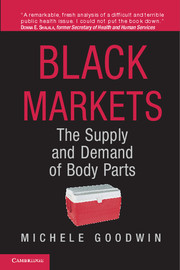Book contents
- Frontmatter
- Dedication
- Epigraph
- Contents
- Miscellaneous Frontmatter
- Preface
- Acknowledgments
- BLACK MARKETS
- PART ONE UNDERSTANDING THE STRAIN ON ALTRUISM
- 2 Institutional Supply, Demand, and Legitimacy
- 3 Nuances, Judicial Authority, and the Legal Limits of Altruism
- 4 Getting the Organ You Want
- PART TWO LEGAL FRAMEWORKS AND ALTERNATIVES
- PART THREE CRITIQUING THE SLAVERY AND BLACK BODY MARKET COMPARISON
- Notes
- Bibliography
- Index
4 - Getting the Organ You Want
from PART ONE - UNDERSTANDING THE STRAIN ON ALTRUISM
Published online by Cambridge University Press: 14 September 2019
- Frontmatter
- Dedication
- Epigraph
- Contents
- Miscellaneous Frontmatter
- Preface
- Acknowledgments
- BLACK MARKETS
- PART ONE UNDERSTANDING THE STRAIN ON ALTRUISM
- 2 Institutional Supply, Demand, and Legitimacy
- 3 Nuances, Judicial Authority, and the Legal Limits of Altruism
- 4 Getting the Organ You Want
- PART TWO LEGAL FRAMEWORKS AND ALTERNATIVES
- PART THREE CRITIQUING THE SLAVERY AND BLACK BODY MARKET COMPARISON
- Notes
- Bibliography
- Index
Summary
Typically, in countries where there are waiting lists, people wait years for organs. With me it's immediate. Because I just get their medical records, forward them to the different hospitals I work with and they make a decision if they want to do it or not and within a few days the person is on a plane to another country in a day or two for testing and within a week they've got a new organ.
INTRODUCTION
As of July 21, 2005, there were 89,012 candidates registered on organ waitlists in the United States. This figure from OPTN does not include those removed from the waitlist, patients too sick to be placed on the waitlists due to cancer or some other illness, or the very unfortunate who never make it onto the list because their conditions have not been diagnosed or they simply have not been referred. Thousands of these candidates will die before the end of the year. For each loss, many more will come to wait in her place. Relatives will be tested to see if there is a blood match; some will be pressured to donate. Other waitlist candidates will take a gamble and turn to the black market and seek a living donor outside of the U.S. transplantation system, in Brazil or perhaps India. Still, others may call Jim Cohane, an “organ transplantation coordinator,” who arranges for organ transplantations abroad. I interviewed Jim for this book. His fees are on the steep side, $125,000 for a kidney, but that includes transportation costs (airfare and local travel), a companion ticket, and an organ. This is the status of organ transplantation for Americans.
This brief chapter closes Part I of Black Markets by describing the organ referral and allocation processes. It provides the reader an overview of the general dynamics of organ referral and also the criteria for organ allocation. Section A discusses the organ referral process. It becomes clear in this section that “there is no science to the referral process.” This section is informed by interviews with Joel D. Newman, Communication Liaison, United Network for Organ Sharing; Jack Lynch, Community Affairs Director for the Illinois organ procurement organization, Gift of Hope; and several others who helped to explain the referral process from their perspective or that of the organizations for which they work.
- Type
- Chapter
- Information
- Black MarketsThe Supply and Demand of Body Parts, pp. 85 - 106Publisher: Cambridge University PressPrint publication year: 2006



